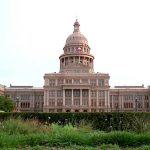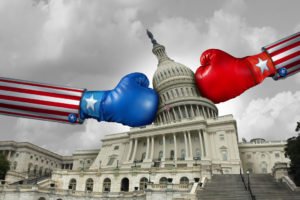Originally posted by Wes Rapaport for KXAN.com.
The state’s ‘Big 3’ — Gov. Greg Abbott, Lt. Gov. Dan Patrick, and House Speaker Dennis Bonnen— penned a letter to the State Agency Board, Appellate Court Justices and Judges, as well as leaders of higher education institutions, with directives to identify ways to reduce state agency budgets.
Citing “significant economic uncertainty,” Abbott, Patrick and Bonnen said “every state agency and institution of higher education must engage in prudent fiscal management efforts.”
“We are confident that Texas will get back to work and continue leading the nation in job growth, economic innovation, and business creation,” the trio wrote. “However, it will take months until we know the true extent of the economic ramifications of COVID-19, and how combating this virus will impact state finances. To prepare for this economic shock, we must take action today to ensure that the state can continue providing the essential government services that Texans expect.”
The savings will help offset current year revenue losses and provide the smoothest path forward toward recovery, they said.
“Some cost saving strategies that agencies should pursue that will not affect the state’s response to COVID-1 9 include foregoing any capital expenditures that can be deferred, any avoidable travel expenditures, any administrative expenses that are not mission critical, and keeping unfilled any open positions that are not essential to the COVID-l9 response,” the letter, dated May 20, stated. “These savings should be lapsed to the Treasury.”
Abbott, Patrick and Bonnen requested institutions of higher education submit a plan to identify savings for the next round of appropriations when the legislature reconvenes in January. The plans are due June 15, 2020.
“We’re going to have to have agencies make cuts,” Bonnen said in an interview Tuesday.
Just yesterday, I asked Speaker @RepDennisBonnen what budgetary considerations state leaders are going to have to make in response to #COVID19.
WATCH his response: #txlege #coronavirus https://t.co/EyvqKMc7MQ pic.twitter.com/4pwPy7Mqox— Wes Rapaport (@wesrap) May 20, 2020
“Frankly, the sooner we begin the process of having agencies make these cuts, the less impactful it will have to be down the road, and we can mitigate the overall impact by cutting sooner rather than later,” Bonnen said.
Agencies excluded from the budget cuts include:
- Texas Division of Emergency Management
- Texas Department of State Health Services
- Texas Workforce Commission
- Texas Military Department
- Texas Department of Public Safety
Also exempt from the budget reductions are debt service requirements, bond authorizations, law requirements for the Foundation School Program, funding for Child Protective Services and funding for behavioral health service programs. Funding for correctional security operations and correctional managed health care at the Texas Department of Criminal Justice was also spared, as are appropriations to health related institutions and community colleges. Benefits for Medicaid and the Children’s Health Insurance Program, the foster care program, adoption subsidies program, permanency care assistance program and services for individuals with intellectual or developmental disabilities are also excluded.
The state also exempted employer contributions to the Teacher Retirement System and Employees Retirement System funds and to Social Security.
“Every state agency and institution should prepare to submit reduced budget requests as well
as strategies to achieve further savings,’ the trio wrote. “Furthermore, when the state revenue picture becomes clearer in the coming months, it may become necessary to make additional budget adjustments.”
Abbott, Patrick and Bonnen wrapped their letter by stating that the state would not impede an agency’s response to the novel coronavirus.





